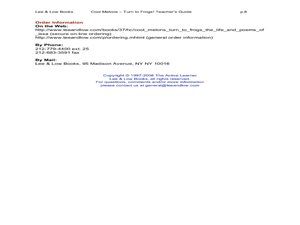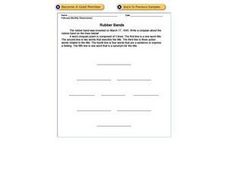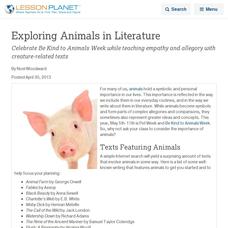Curated OER
Cool Melons Turn to Frogs
Third graders become familiar with the poetry of Issa. For this haiku lesson, 3rd graders recognize the format of a haiku and learn about the life of Issa (the poet) through focused questions, vocabulary and reading responses. Students...
Curated OER
Rubber Bands Cinquain
In this writing a cinquain poem about rubber bands worksheet, students read the history of rubber bands and directions telling how to write a cinquain and write the five line poem. Students write 1 poem.
Curated OER
Follow the Directions
Young scholars listen to a confusing poem about baseball. In this clear writing lesson, students write a set of directions for a game. Young scholars rewrite their directions until they are clearly understood. Students make...
Curated OER
Poets of Christmas Past
Students consider the meanings of Christmas by reading an op-ed. As a class, they then create a sequel to the poem "A Visit from Saint Nicholas," in which "Mamma" tells a story about the history of Christmas.
Curated OER
Resistance Poetry
Students create a definition for the term resistance. Once a definition has been created, they create a visual image to correlate with their definition. Working in groups, students read several different resistance poems and classify...
Pearson
Rumpelstiltskin
Classic fairy tales are great! They have memorable characters, present interesting story lines, and lend themselves to art projects. Grab a copy of "Rumpelstiltskin" and get ready to participate in several early literacy activities. The...
Teachers.net
Figurative Language
When is a staple remover a fanged monster? In your ELA classroom when you're teaching this fun figurative language lesson, of course! Get your young writers using figurative language by making a game of it. Give groups a paper bag full...
Curated OER
Veterans' Voyages
Introduce your middle and high schoolers to a different perspective on war: that of soldier's. Read Guisseppi Ungaretti's poem "Vigil" to kick-start this instructional activity. After discussing his perspective, read "The Screaming...
Curated OER
The First World War
Students examine the process and effects of World War I on different segments of the population, beyond the political, diplomatic and military framework of the war. They analyze the memoirs of soldiers, read poetry of the time, and...
Curated OER
Music in Words
Your class can build strong, well-represented opinions about the music they hear. They listen to, and share thoughts about, a piece of classical music. Then they write a piece of music or a poem, and analyze their peers' work and their...
Curated OER
Animal Fact or Fiction?
Read and discuss the article "Welcome to Cicadaville (Enter at Your Own Risk)" to gain a better understanding around the confusion regarding cicadas and locust swarms. In groups your young analysts research statements about animals to...
Curated OER
Exploring Animals in Literature
Celebrate Be Kind to Animals Week while teaching empathy and allegory with creature-related texts
Curated OER
Comparing The Odyssey and "The Lotus Eaters"
Ninth graders compare the development of text in Book 5 of "The Odyssey" to Alfred Lord Tennyson's poem "The Lotus Eaters." After discussing the comparison's of the two text within a group, they create an original piece of work or...
Curated OER
The Tell-Tale Hearts of Writers
Knock, knock, knock...Creep out your class with a critical thinking lesson focused on word relationships in Edgar Allen Poe's "The Tell-Tale Heart." They investigate the relationship between word choice, mood, and interpretation of...
Curated OER
Ornithology and Real World Science
Double click that mouse because you just found an amazing lesson! This cross-curricular Ornithology lesson incorporates literature, writing, reading informational text, data collection, scientific inquiry, Internet research, art, and...
Curated OER
Do You Haiku? We Do!
Third graders try their hands at writing Haiku, a form of Japanese poetry. Haiku is usually 17 syllables in three-line form. This engaging lesson has many excellent worksheets and website imbedded in the plan. They share their finished...
Curated OER
The Sonnet Challenge
Learners are given information about two popular sonnet forms-English and Italian. They are given the rules for writing a sonnet. Students are asked what type of sonnet they would use. They are each given a sheet of paper and asked...
Curated OER
Show Don't Tell
Students review the Show Don't Tell method of writing haiku poetry. They practice distinguishing poetic language from academic language and create poems based on images, not explanations.
Curated OER
Analyzing Poetic Devices: Robert Hayden's "Those Winter Sundays" and Theodore Roethke's "My Papa's Waltz"
Students examine how Robert Hayden and Theodore Roethke incorporate poetic devices to convey meaning in the poems, 'Those Winter Sundays,' and 'My Papa's Waltz.' They listen to audio clips, explore websites, and write an analysis of the...
Curated OER
Snowflake Bentley
Learners explore crystals through the story Snowflake Bentley and then create crystal pictures of their own. In this interdisciplinary lesson, they create a crystal web chart on chart paper, design artificial snowflakes, and write poems...
Curated OER
"Here's much to do with hate, but more with love": The Prologue in Romeo and Juliet
Young scholars participate in a guide close reading of the Prologue to Romeo and Juliet. They write a prologue sonnet to another piece of literature they have read.
Curated OER
America's Civil Rights Movement, Activity Five
Students read and write poems for two voices about the Civil Rights Movement.
Our White House
The Our White House Inauguration Celebration Kit for Kids!
Get the youngest American citizens involved in the presidential election and inauguration with a set of social studies activities. Focusing on the history of presidential inauguration ceremonies, learners draft their own poems, design...
K5 Learning
Dessert Time!
First do this and then do that. Next do this and after do that. Young readers read about the order each person in the story gets dessert, before answering the who, the what, and the how in the reading passage.

























